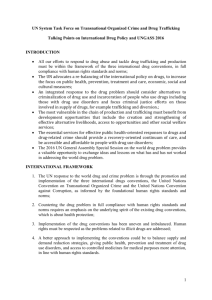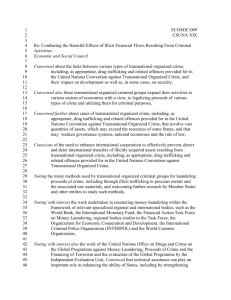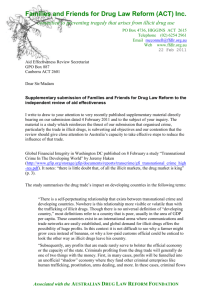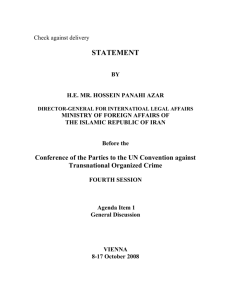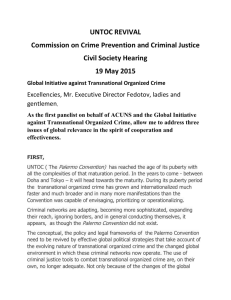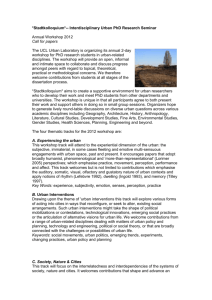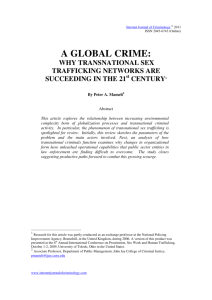Course Syllabus - Kennesaw State University
advertisement
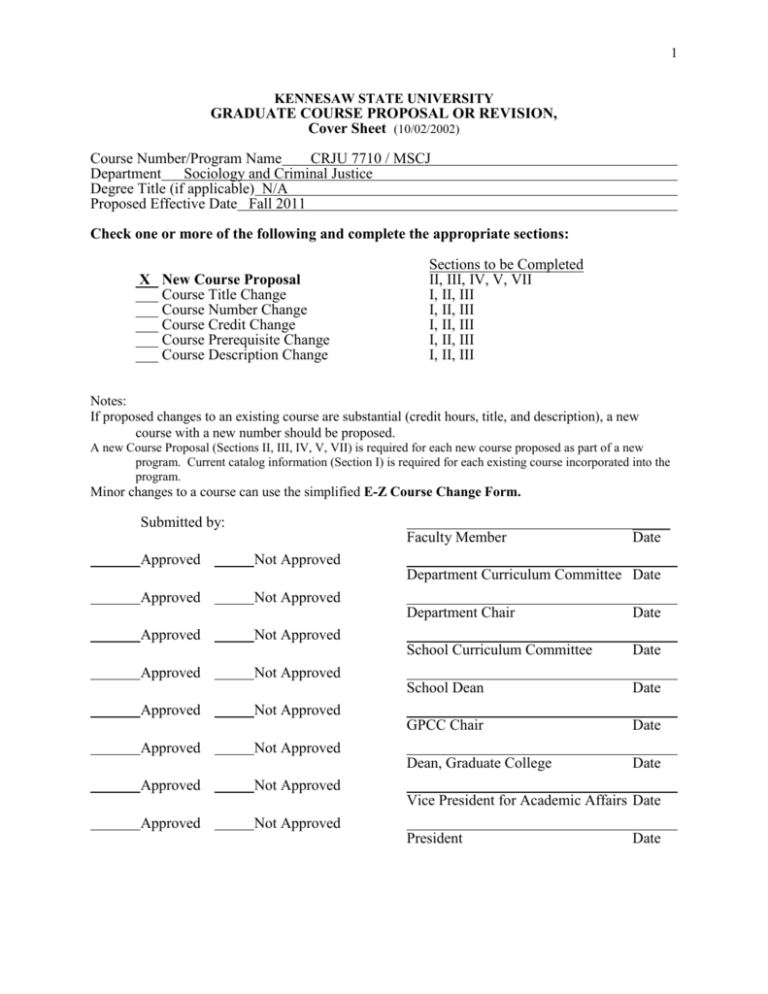
1 KENNESAW STATE UNIVERSITY GRADUATE COURSE PROPOSAL OR REVISION, Cover Sheet (10/02/2002) Course Number/Program Name CRJU 7710 / MSCJ Department Sociology and Criminal Justice Degree Title (if applicable) N/A Proposed Effective Date Fall 2011 Check one or more of the following and complete the appropriate sections: X New Course Proposal Course Title Change Course Number Change Course Credit Change Course Prerequisite Change Course Description Change Sections to be Completed II, III, IV, V, VII I, II, III I, II, III I, II, III I, II, III I, II, III Notes: If proposed changes to an existing course are substantial (credit hours, title, and description), a new course with a new number should be proposed. A new Course Proposal (Sections II, III, IV, V, VII) is required for each new course proposed as part of a new program. Current catalog information (Section I) is required for each existing course incorporated into the program. Minor changes to a course can use the simplified E-Z Course Change Form. Submitted by: Faculty Member Approved _____ Date Not Approved Department Curriculum Committee Date Approved Approved Approved Approved Approved Approved Not Approved Department Chair Date School Curriculum Committee Date School Dean Date GPCC Chair Date Dean, Graduate College Date Not Approved Not Approved Not Approved Not Approved Not Approved Vice President for Academic Affairs Date Approved Not Approved President Date 2 KENNESAW STATE UNIVERSITY GRADUATE COURSE/CONCENTRATION/PROGRAM CHANGE I. Current Information (Fill in for changes) Page Number in Current Catalog Course Prefix and Number Course Title Credit Hours Prerequisites Description (or Current Degree Requirements) II. Proposed Information (Fill in for changes and new courses) Course Prefix and Number __CRJU 7710____________________ Course Title Transnational Crimes and International Security_ Credit Hours 3-0-3 Prerequisite: Admission to the MSCJ Program or permission of the MSCJ Program Director. Description (or Proposed Degree Requirements) This course examines legal and institutional responses to and international cooperation against transnational crime, particularly terrorism, human and drug trafficking. Topics include the analysis of the concept of universal jurisdiction that provides a basis for treating certain crimes as "transnational” and “international" and an evaluation of the range of institutions created to track and punish international criminals (such as the International Criminal Court). III. Justification Students enrolled in the Masters’ degree program in Criminal Justice must complete 18 credit hours of required core courses and 15 hours of electives. The 15 credit hours of electives consist of 5 (five) courses concentrated in two areas: Comparative/International Perspectives and Criminal Justice Policy. CRJU 7710 is one of the five electives that emphasizes the former and reflects the theme of KSU’s Quality Enhancement Plan (QEP) on global learning. 3 IV. Additional Information (for New Courses only) Instructor: Stan Crowder Texts: 1) The 2007 Trafficking in Persons Report. U.S. State Department. The National Strategy for Combating Terrorism. 2) Assessment of U.S. Government Efforts to Combat Trafficking in Persons (FY 2005) dated September, 2006. U.S. Printing Office. 3) Albanese, J. (2005). Transnational Crime. Whitby, ON: de Sitter Publications. 4) Kelly, R.J. et al. (2005). Illicit Trafficking: A Reference Handbook. Santa Barbara, CA: ABC-CLIO. 5) Purpura, P. P. (2007). Terrorism and Homeland Security: An Introduction with Applications. Burlington, MA: Butterworth-Heinemann. 6) Reichel, P.L. (2005). Handbook of Transnational Crime and Justice. Thousand Oaks, CA: Sage Publications. 7) Williams, P. and Vlassis, D. (2001). Combating Transnational Crime: Concepts, Activities, and Responses. Portland, OR: Frank Cass. Objectives: Students should be able to: 1) Discuss the scope and nature of modern day slavery 2) Describe and evaluate policy approaches to human trafficking 3) Assess U.S. Government domestic anti-trafficking efforts to dealing with transnational crimes 4) Determine the roles of organized crime and transnational crime in illicit trafficking 5) List and evaluate the four fronts in the National Strategy for Combating Terrorism 6) Discuss four major Acts of Congress to combat terrorism 7) Evaluate the roles of the United Nations, international law, and international courts in dealing with transnational crimes and international security issues Instructional Method Student learning occurs through a variety of teaching techniques, including lectures, guest speakers, PowerPoint presentations, class discussions, group discussions, and use of educational videos. Since this is a graduate level course, more class time will be devoted to more student-student and/or student-instructor interaction to better enrich the student learning experience. Method of Evaluation Final grade will be based on Exam 1 (60 points), Exam 2 (80 points), research paper (60 points), a total of 200 points. The final grading scale below will be applied: A = 90%-100% or 179-200 points 4 B = 80%-89% or 159-178 points C = 70%-79% or 139-158 points D = 60%-69% or 119-138 points F = less than 60% or 118 or fewer points V. Resources and Funding Required (New Courses only) Resource Amount Faculty Other Personnel Equipment Supplies Travel New Books New Journals Other (Specify) TOTAL Funding Required Beyond Normal Departmental Growth 5 VI. COURSE MASTER FORM This form will be completed by the requesting department and will be sent to the Office of the Registrar once the course has been approved by the Office of the President. The form is required for all new courses. DISCIPLINE COURSE NUMBER COURSE TITLE FOR LABEL (Note: Limit 16 spaces) CLASS-LAB-CREDIT HOURS Approval, Effective Term Grades Allowed (Regular or S/U) If course used to satisfy CPC, what areas? Learning Support Programs courses which are required as prerequisites APPROVED: ________________________________________________ Vice President for Academic Affairs or Designee __ 6 VII Attach Syllabus 7 Course Syllabus CRJU 7710 (Transnational Crimes and International Security) Instructor: Stan Crowder Office number: SO 4063 Phone: 770-423-6253 Email: Scrowder@kennesaw.edu Prerequisite: Admission to the MSCJ Program or permission of the MSCJ Program Director. Course description: This course examines legal and institutional responses to and international cooperation against transnational crime, particularly terrorism, human and drug trafficking. Topics include the analysis of the concept of universal jurisdiction that provides a basis for treating certain crimes as "transnational” and “international" and an evaluation of the range of institutions created to track and punish international criminals (such as the International Criminal Court). Course Objectives: At the end of this course, each student should be able to: 1) Discuss the scope and nature of modern day slavery 2) Describe and evaluate policy approaches to human trafficking 3) Assess U.S. Government domestic anti-trafficking efforts to dealing with transnational crimes 4) Determine the roles of organized crime and transnational crime in illicit trafficking 5) List and evaluate the four fronts in the National Strategy for Combating Terrorism 6) Discuss four major Acts of Congress to combat terrorism 7) Evaluate the roles of the United Nations, international law, and international courts in dealing with transnational crimes and international security issues Required Materials (including texts, calculators, and library reserve readings): The 2007 Trafficking in Persons Report. U.S. State Department. The National Strategy for Combating Terrorism. Assessment of U.S. Government Efforts to Combat Trafficking in Persons (FY 2005) dated September, 2006. U.S. Printing Office. Public Law 106-386 Albanese, J. (2005). Transnational Crime. Whitby, ON: de Sitter Publications. Kelly, R.J. et al. (2005). Illicit Trafficking: A Reference Handbook. Santa Barbara, CA: ABCCLIO. Purpura, P. P. (2007). Terrorism and Homeland Security: An Introduction with Applications. Burlington, MA: Butterworth-Heinemann. Reichel, P.L. (2005). Handbook of Transnational Crime and Justice. Thousand Oaks, CA: Sage Publications. Williams, P. and Vlassis, D. (2001). Combating Transnational Crime: Concepts, Activities, and Responses. Portland, OR: Frank Cass. There also will be some supplemental articles for assigned reading. 8 Course Requirements: Exam One (Week 7) Exam Two (Week 14) Research Paper (due Week 11) Total 60 80 60 200 points points points points The final grading scale below will be applied: A = 90%-100% or 179-200 points B = 80%-89% or 159-178 points C = 70%-79% or 139-158 points D = 60%-69% or 119-138 points F = less than 60% or 118 or fewer points Research Paper: Your research paper must detail the link between the trafficking of humans, drugs, and other organized crime activity contributions to terrorism and the future of American responses to combat each area. The paper must conform to the APA writing style and include a minimum of 10 (ten) refereed article citations. Class Attendance and Participation: KSU expects students to attend course lectures on a regular basis. Successful learning and understanding of the class materials require class attendance and active participation in classroom discussions. Note taking in the class is recommended since all readings from the text, handouts, and videos are subject to inclusion on exams. Students will be penalized 10 points on the final grade for every class missed. Academic Integrity Statement: Every KSU student is responsible for upholding the provisions of the Student Code of Conduct, as published in the Undergraduate and Graduate Catalogs. Section II of the Student Code of Conduct addresses the University ’s policy on academic honesty, including provisions regarding plagiarism and cheating, unauthorized access to University materials, misrepresentation/falsification of University records or academic work, malicious removal, retention, or destruction of library materials, malicious/ intentional misuse of computer facilities and/or services, and misuse of student identification cards. Incidents of alleged academic misconduct will be handled through the established procedures of the University Judiciary Program, which includes either an “informal” resolution by a faculty member, resulting in a grade adjustment, or a formal hearing procedure, which may subject a student to the Code of Conduct ’s minimum one semester suspension requirement. Accommodations for Students with Disabilities: KSU provides program accessibility and reasonable accommodations for students defined as disabled under Section 504 of the Rehabilitation Act of 1973 or the Americans with Disabilities Act of 1990. A number of services are available to help disabled students with their academic work. In order to make arrangements for special services, students must visit the Office of Disabled Student Support Services (located on the second floor of the Student Center) and arrange an individual assistance plan. Writing Center: KSU also offers a free service to all students with the goals of not only helping students write better papers, but also making the students become better writers. I encourage you 9 to visit their office in the Humanities Building (Room 242) and talk to their personnel about your writing assignments. You can also go to their website at http://www.kennesaw.edu/english/WritingCenter/ and click on the “Make an Appointment” link. Incompletes: According to the KSU catalog regarding an “incomplete grade (I), a grade of incomplete “will be awarded only when the student has done satisfactory work up to the last two weeks of the semester, but for nonacademic reasons beyond his/her control is unable to meet the full requirements of the course.” Make-Up Exam Policy: Each student is expected to take all the exams on the scheduled dates. Students with a valid excuse (and hopefully with prior approval from the instructor) for missing a scheduled exam may make up one test. Make-up exams will be given at the end of the semester and may consist entirely of essay questions. Students can make up one exam only. Course outline/reading schedule in the table below: Dates Topics Readings Week 1 Week 2 Transnational Organized Crime- Overview Scope and nature of modern day slavery Week 3 Policy approaches to trafficking in persons Week 4 Week 9 Organized crime and transnational crime in illicit trafficking Characteristics of transnational crime groups Combating Transnational Crime Drug trafficking trends Exam One Atlanta High Intensity Drug Trafficking Area Office Narco-Terrorism Links and Analysis Week 10 National Strategy for Combating Terrorism Week 11 FBI - Joint Terrorism Task Force Research Paper Due Georgia Information Sharing and Analysis Center Hand-outs Acts of Congress to combat terrorism US Government Printing Office Documents United Nations, international law, and international courts Exam Two Capstone Table Top Exercise Week 5 Week 6 Week 7 Week 8 Week 12 Week 13 Week 14 Week 15 Albanese, Reichel The 2007 Trafficking in Persons Report. Assessment of U.S. Government Efforts to Combat Trafficking in Persons Albanese, Reichel, Kelly Albanese, Reichel, Kelly Williams, P. and Vlassis, D. Kelly Guest Lecture HIDTA Director Guest Lecture FBI Liaison to ATL US Attorney’s Office US Government Printing Office Document Hand-outs
